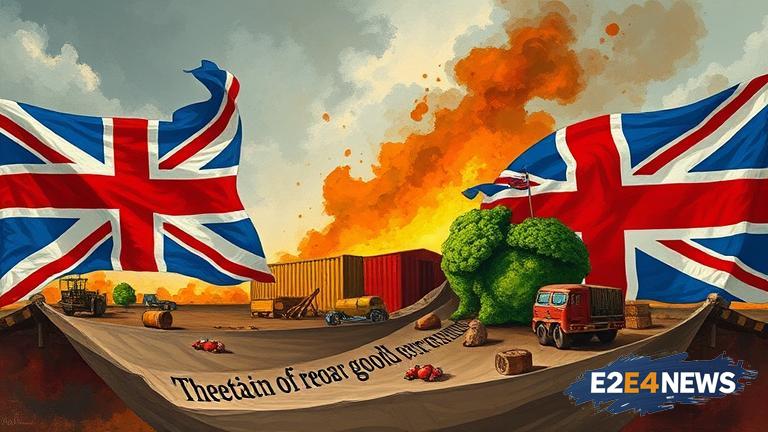The UK’s decision to leave the European Union, commonly known as Brexit, has sent shockwaves throughout the global economy. One of the most significant concerns is the potential impact on food security. With the UK relying heavily on imports to feed its population, any disruption to trade could have severe consequences. Ian Dunt, a British journalist and author, recently discussed the issue on the Australian Broadcasting Corporation’s Late Night Live program. Dunt warned that the UK’s departure from the EU could lead to a shortage of certain food products, particularly meat and dairy. This is because the UK is heavily reliant on EU imports, and any tariffs or trade barriers could make these products more expensive. Furthermore, the UK’s agricultural sector is not equipped to meet the country’s food demands, making it even more vulnerable to disruptions. The situation is further complicated by the ongoing trade wars between the US and China, which are having a ripple effect on global trade. The US-China trade war has already led to a significant increase in food prices, and any further escalation could have devastating consequences for global food security. In addition to the economic implications, there are also concerns about the environmental impact of Brexit and trade wars. The increased transportation costs and tariffs could lead to a rise in greenhouse gas emissions, exacerbating climate change. The situation is not limited to the UK, with other countries such as Thailand and Cambodia also feeling the effects of the trade wars. These countries are heavily reliant on exports, and any disruption to global trade could have severe consequences for their economies. The mad cow disease outbreak in the UK in the 1990s is a stark reminder of the potential consequences of a food security crisis. The outbreak led to a significant decline in beef exports, resulting in economic losses for farmers and the wider industry. Similarly, the current trade wars and Brexit could lead to a decline in food exports, resulting in economic losses for farmers and the wider industry. The World Trade Organization (WTO) has warned that the ongoing trade tensions could lead to a decline in global trade, resulting in economic losses for countries around the world. The WTO has called for calm and restraint, urging countries to work together to resolve their differences. However, with the current state of global politics, it remains to be seen whether countries will be able to put aside their differences and work towards a more cooperative and collaborative approach to trade. In the meantime, experts are warning of a potential food security crisis, with some predicting that the world could be on the brink of a global food shortage. The situation is complex and multifaceted, with many different factors at play. However, one thing is clear: the ongoing trade wars and Brexit have the potential to have a profound impact on global food security, and it is essential that countries work together to mitigate these risks. The use of technology, such as blockchain, could help to increase transparency and efficiency in the food supply chain, reducing the risk of disruptions. Additionally, countries could work together to develop more resilient and sustainable food systems, reducing their reliance on imports and minimizing the risk of shortages. Ultimately, the key to addressing the potential food security crisis is cooperation and collaboration. Countries must work together to resolve their differences and develop a more cooperative approach to trade, prioritizing the needs of consumers and the environment. By doing so, we can mitigate the risks associated with Brexit and trade wars, and ensure a more sustainable and secure food system for generations to come.
